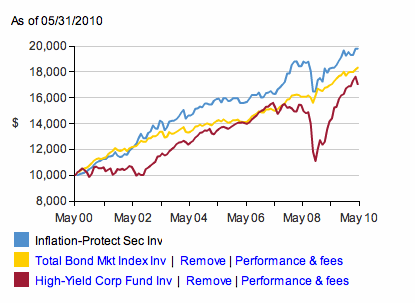ESRwannabe
Full time employment: Posting here.
- Joined
- Mar 19, 2010
- Messages
- 889
A junk bond fund I was looking at has a yield of around 8%. I believe that historically for a BB fund you will have around 2% defaults a year and from those a recovery of 40% of principal is the average. So, if one were to be overly pessimistic you could take 2% off the yield to account for defaults (assume zero principal recovered on a default).
Now to account for inflation you could subtract that also. So, lets just say 3% inflation. So that leaves you with 3% real return. That seems pretty good to me given all the uncertainty, provided you have space for it in an IRA.
What am I missing?
Now to account for inflation you could subtract that also. So, lets just say 3% inflation. So that leaves you with 3% real return. That seems pretty good to me given all the uncertainty, provided you have space for it in an IRA.
What am I missing?

